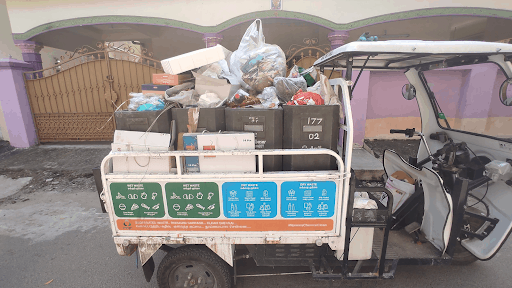Greater Chennai Corporation urges residents to pay property tax
Only 6.88 lakh (52%) of the total 13 lakh assessees in the Greater Chennai Corporation (GCC) limit have paid property tax for the first half of the financial year 2022-23. The deadline for remitting the tax without penalty is September 30th, beyond which the civic body would levy fines. A sum of around Rs 570 crore has been collected so far, with the civic body expecting a collection of Rs 650 crore by the end of the month.
Notably, around 63% of those who have paid the taxes so far are the owners of properties measuring 50,000 square feet and more. Around 60% of payments received so far are through the online payment mode. Assuring the public that the glitches in the online payment mode have been addressed, Deputy Commissioner (Revenue and Finance) Vishu Mahajan, has urged them to pay the taxes on time.
Source: The Hindu
Read more: Explainer: How is your revised property tax being computed in Chennai?
Petroleum compounds found in groundwater in Tondiarpet
Even ten years after an oil pipeline breach, traces of petroleum compounds were found in groundwater near the residential areas close to Bharat Petroleum’s facility in Tondiarpet, revealed a new report submitted by the Central Pollution Control Board (CPCB) to the National Green Tribunal (NGT).
The residents found black sludge dripping from their water taps when Bharat Petroleum Corporation Limited (BPCL) was drilling wells in 2012 in Tondiarpet. BPCL accepted that the oil leak from one of the pipes used in carrying oil from Chennai Port to the refineries in northern parts of Chennai caused the black sludge. Though remedial measures were undertaken, it all came to a halt with the commencement of Chennai Metro Rail Limited construction works. This pushed the residents to knock on the doors of NGT, which not only ordered BPCL to complete the clean-up work as soon as possible but also compensate all the residents affected on a temporary basis.
When the case came up for hearing in NGT, the CPCB noted that the clean-up work and soil excavation by CMRL resulted in a reduction of 98.6% of petroleum mass. While no trace of petroleum compound was found in soil, traces of the same were found in groundwater.
Source: The Times of India
Volunteers roped in for creating waste segregation awareness

The Greater Chennai Corporation has roped in 200 volunteers and 15 supervisors to create awareness about solid waste management practices among the city residents. The best-performing volunteers are also to be rewarded. Since the GCC is planning to set up its own wet and dry waste composting units in the coming days, receiving mixed garbage will not help in the functioning of such units.
Hence, as part of the awareness drive, the volunteers will be going door-to-door speaking about the importance and method of segregation of biodegradable and non-biodegradable waste in addition to conducting outreach programmes like songs, drama, street plays and activities in schools.
Source: The Times of India
Read more: Home-composting in Chennai: How are people transforming kitchen waste into manure?
Work on for preparation of Chennai’s Third Master Plan
As part of the Tamil Nadu Housing and Habitat Development Project (TNHHDP), a World Bank-financed initiative of the State government for which a sum of $9 million has been approved, the Chennai Metropolitan Development Authority (CMDA) has begun the work to prepare the third master plan for Chennai.
Accordingly, the first visioning workshop, which aims to set the vision for the third master plan that will envisage holistic, environmentally sustainable, economically vibrant and inclusive development in Chennai Metropolitan Area (CMA), was launched by Housing Minister S Muthuswamy on September 19.
Reportedly, three such visioning workshops are likely to be held. Following this, the draft of the third master plan will be finalised for the urban restructuring of Chennai and the third master plan for Chennai is likely to be notified by December 2025 or April 2026.
Source: The New Indian Express
Delivery agents in Chennai protest against Swiggy
Around 800 food delivery agents in Chennai went on a protest for the second day on September 20 claiming that the revised payment structure of Swiggy was exploitive in nature. Reportedly, the agents were demanded to work for longer hours for the same pay.
For instance, an agent who was earning a sum of Rs 12,000 a week by working 10 hours a day would now have to work 15 to 16 hours a day to earn a sum of Rs 13,500. The protest also led to a drop of around 70% in online sales in restaurants across Chennai.
Source: The New Indian Express
[Compiled by Shobana Radhakrishnan]